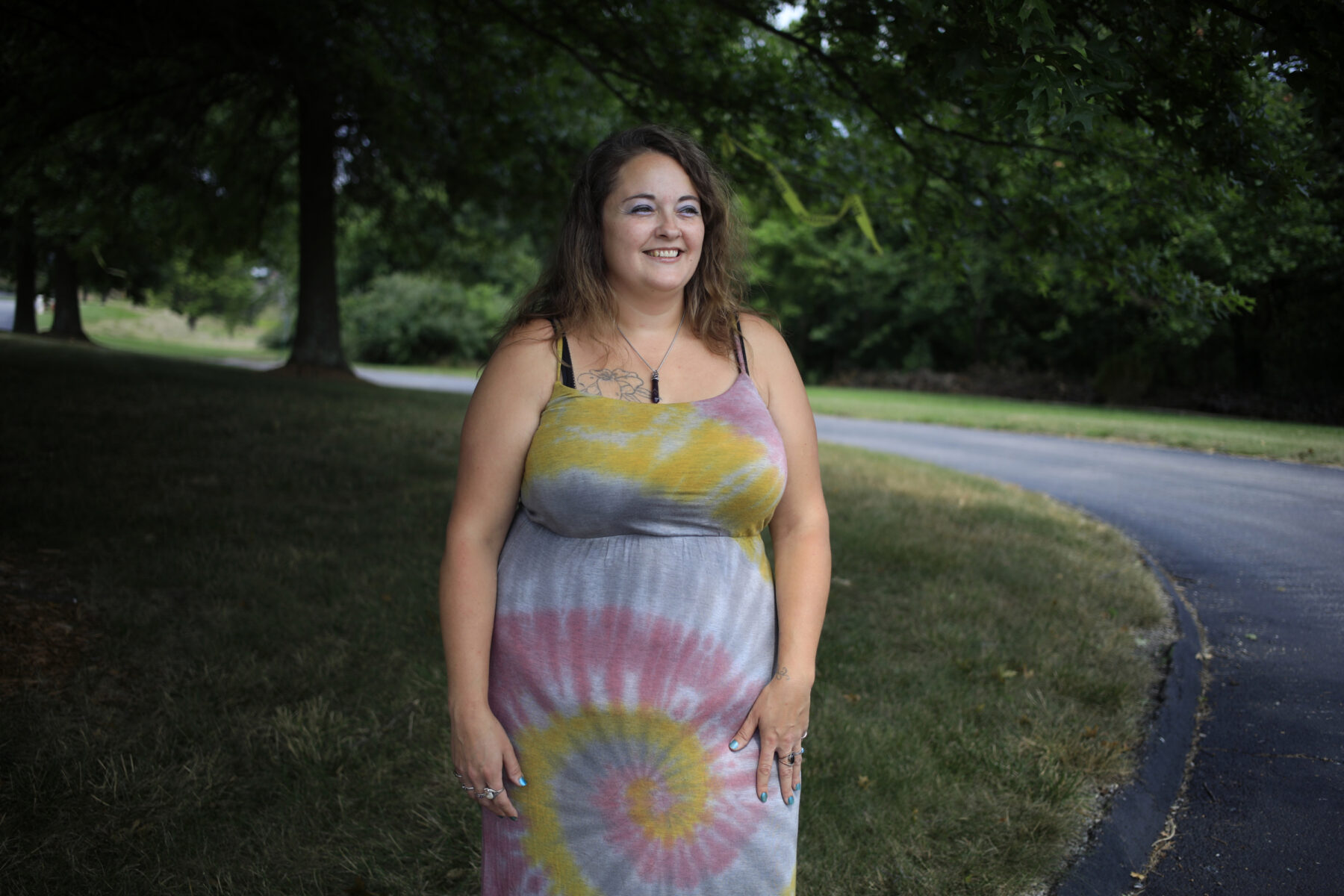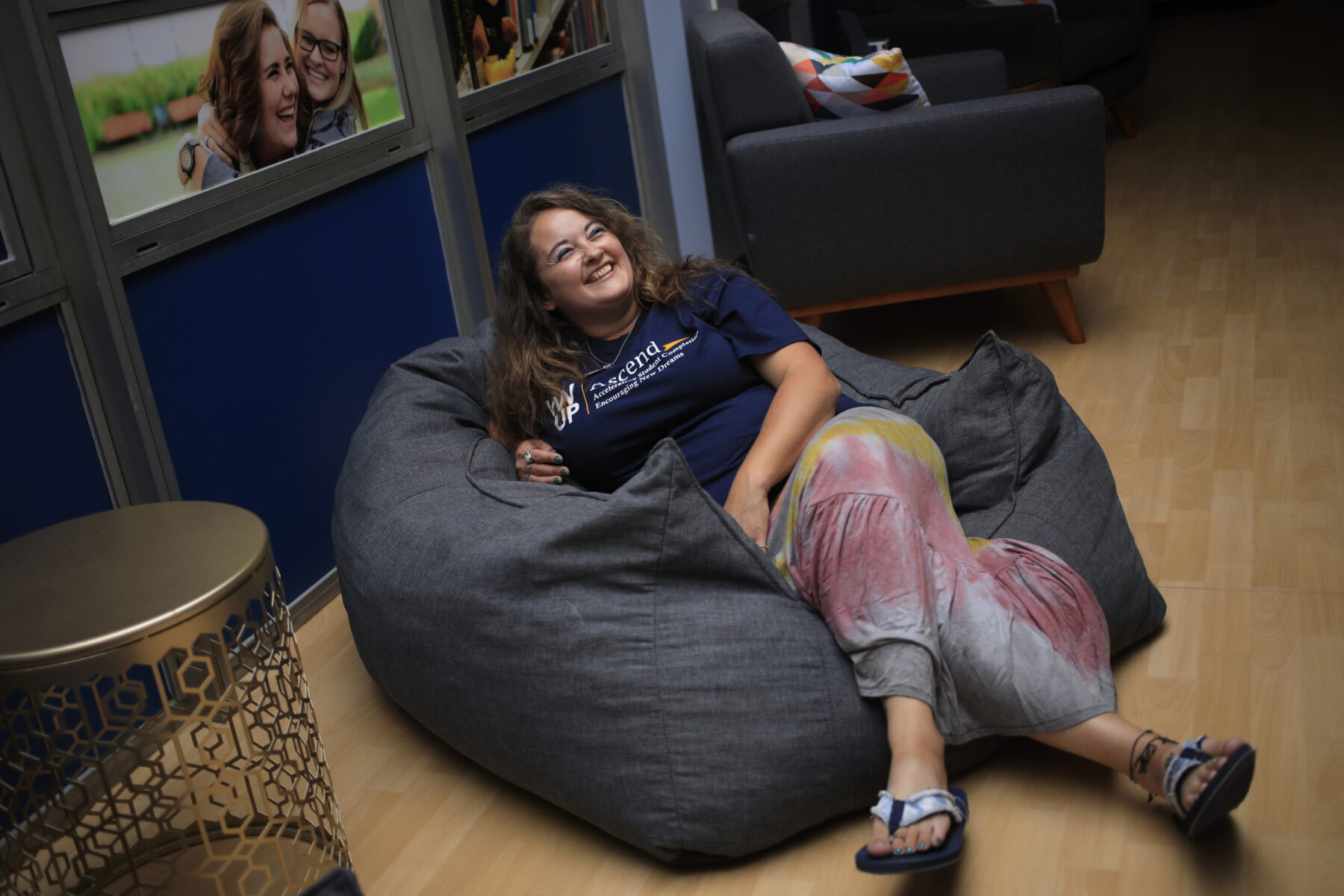When Amber Ward was 16, she dropped out of high school. She grew up in rural West Virginia, and a high school diploma just wasn’t that important to her compared to earning money. But the reality of joining the workforce without a diploma meant that Ward spent more than a decade bouncing from one low wage job to another, from a grocery store to an auto parts store, and she began to reconsider her path. She earned a GED in her 20s, and in her 30s she decided to make a major life change: She would go to college.
When she was accepted at West Virginia University at Parkersburg, she became the first person in her family to go to college.
It wasn’t easy at first. She struggled to juggle her school work, hold a job, and care for her three children, ages 16, 15, and 9. The anxiety she has struggled with her entire life contributed to constant doubts about whether she’d be able to succeed. “I was scared that I would not be able to keep up with my classes,” the now 37-year-old said. “I was scared that I would just fail.”
But she found the college atmosphere to be extremely welcoming. Then the COVID-19 pandemic hit. Her classes moved online a few months into her first semester, and she worried she would lose the support she had found on campus. But an advisor told her about a program coming to campus that would give her the support she needed to earn a degree.
Ward enrolled in the Accelerating Student Completion: Encouraging New Dreams (Ascend) program for the fall 2020 semester, the pilot year of the program at WVU Parkersburg. The program aims to replicate the successful evidence-backed Accelerated Study in Associate Programs (ASAP) model at the City University of New York (CUNY), which was shown in a previous randomized controlled trial to nearly double three-year graduation rates at the three largest CUNY community colleges. State college officials selected WVU Parkersburg alongside Blue Ridge Community and Technical College in Martinsburg to pilot the $4.2 million program in West Virginia last year. It is the kind of program that could benefit if President Biden’s recently proposed $62 billion College Completion Fund — a grant program to invest in scaling evidence-based programs to improve completion rates — becomes reality.
Amount proposed as part of President Biden’s College Completion Fund — a grant program to invest in scaling evidence-based programs to improve completion rates
College Completion, Long-Term Earnings
The model for the college completion program, which also has been replicated in Ohio, California, New York state, and Tennessee, requires full-time enrollment, and provides advising, financial assistance, and other support to students to help them complete their associate’s degree and either transition to a four-year college or the workforce. While both pilots are replicating the ASAP model, this version — as in the other implementations — is adapted for the unique needs of the service area and student body. The West Virginia programs are occupationally focused, targeting majors that are in demand in the local economy.
The ultimate goal is to increase both college completion and long-term earnings: The national six-year completion rate is just over 60%. The likelihood of completion is especially low for students of color and students from low-income families.
“We know that those who start but don’t complete degrees face the worst outcomes in higher education,” said Michelle Dimino, education senior policy advisor with Third Way, a public policy think tank. “Students who leave college with debt and no degree are about three times more likely to default on their student loans.”
College completion programs like Ascend aim to make sure that more people who attend college earn a degree and graduate without the burdens of large amounts of debt.
Programs like this are expensive, and only a handful have rigorous evidence of increasing college graduation rates. The Biden Administration’s commitment to expanding these programs is in the American Families Plan that was introduced in April. The proposed $62 billion College Completion Fund would have a special focus on colleges and universities that serve high numbers of low-income students.
Advocates say the first-of-its-kind federal funding would be transformative for higher education.
“We think of this as a sea change in federal higher education policy,” Dimino said. “It’s a fundamental shift from focusing on getting students to college to also focusing on getting students through college, and a recognition that we can do this by investing in these proven interventions that will help more students make it across the finish line to a degree.”
We think of this as a sea change in federal higher education policy.Michelle Dimino education senior policy advisor with Third Way, a public policy think tank
‘I Know That I Have That Support System’
Ward quickly became a success story of the program, and is on track to earn a degree. She earned As in almost all of her classes and has a 3.96 GPA, she said. She discovered her interest in writing and won awards for her nonfiction from the college’s literary magazine. She was able to stop working in addition to going to school. And she used the program’s Kroger incentive cards to help pay for gas and to feed her two growing teenagers. She said she has found a community of people who have helped her with both academic and personal issues, and now she views her advisors as family.
“I was going through a very rough time and struggling to find a place for my kids and I to live” after starting the program, she said. “I went through about a six-month period that is just now starting to level out, and I still managed to end my spring semester with As. I still managed to be OK mentally and not have the nervous breakdown that I feel like I was on the edge of because I could email them or text them at any time or just go to the college and see them, and that keeps me going. I know that I have that support system.”
Ward is studying for an associate’s degree in business administration, which she will earn next year, and she plans to continue on to earn a bachelor’s degree in multidisciplinary studies in business, sociology, and English.
She said that of the services Ascend offers, she found working with her advisor and with tutors to be critical to her college experience. She’s been able to ask questions she may have been afraid to ask in a larger class setting and she has had someone help her choose classes and stay focused on her career path. Though she entered college unsure of what she would want to do with her career, she said the Ascend program and the career benchmark assessment she took through the program made her realize that she likes working with and helping people. Now, her goal is to work in human resources at a college.
“Having to meet with your advisor so often is also a really good thing because you get comfortable saying, ‘Hey I’m not really sure what I want to do,’” she said.

Jennifer Forster, who runs the Ascend program at WVU Parkersburg, said additional funding from the Student Success Fund would allow the school to expand the program to all majors. “I would expand exactly what we are doing if there was more money out there,” she said.
Forster said she believes the program’s success comes from the advisors who meet with students regularly — typically twice a month — and who can reach out when they think a student might be struggling or might need encouragement. “A lot of our students suffer from self-doubt and sometimes it just takes someone saying, ‘You’re doing fine’ to get them through the next couple days,” she said. “That connection makes a difference, particularly in the time of the pandemic when we were virtual.”
A Combination of Strategies
Alex Mayer, director for postsecondary education policy at MDRC, a social policy research organization that has independently evaluated the CUNY ASAP program, said he believes the success of the program and potentially its replications comes from a combination of strategies, including the dedicated advisors.
“The students are very diverse in their experiences and strengths and the support that can really help them. Having a centralized advisor that can help students navigate college and access other resources at the college is very important to the success of ASAP,” the program Ascend is based on. “Those advisors also reinforce other key aspects of the program, like the requirement to stay enrolled full-time and the additional financial supports.”
This year, Ward will get to try out a career in an academic institution and help other students like herself. She has a work study job with the Ascend program.
Because of Ward’s success and potential, Forster said she has asked her to speak about her experiences at Ascend recruiting events and other university functions. Ward said that thanks to those experiences and the confidence she has developed through the program, she was able to overcome her anxiety and get up in front of her church to give testimony this year.
“I was shaking inside but thanks to being in the setting that I’ve been in at the school and getting used to doing things that I’m not comfortable with, I was able to get up there and give my testimony and that was probably one of the most amazing experiences of my life,” she said.
Ward is already helping a few of her nieces apply for the Ascend program and she is thrilled with the example she is setting for her three children, including her teenage son who will be the first in her immediate family to graduate from high school next year.
“That is one of the most important things about me being a student right now,” she said. “It’s helping my kids look towards their own futures and be like, ‘Wow, mom. You’re 37. We don’t want to wait until we’re that old to figure out what we want to do with our lives.’ They’re kind of learning from my mistakes and they’re not following in the same tradition of let’s just quit school and go get a job and work the rest of their lives.”
“I feel like I have blossomed since I’ve been in college,” she said. “I’ve found parts of me that I didn’t know existed, I found interests that I didn’t know I had, and I’ve realized goals that I kind of had but I didn’t know I’d be able to achieve. So I feel like [my children] now realize that they can do whatever it is they want to do if they put in the work and time — and that there’s help to get them to where they want to go.”
I feel like I have blossomed since I’ve been in college. I’ve found parts of me that I didn’t know existed, I found interests that I didn’t know I had, and I’ve realized goals that I kind of had but I didn’t know I’d be able to achieve.Amber Ward















